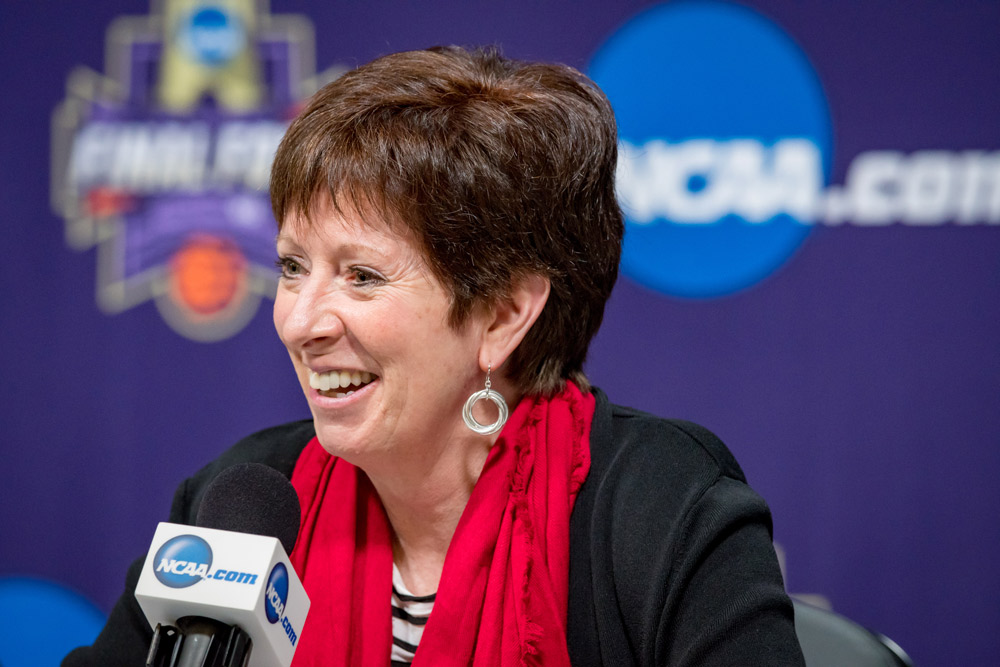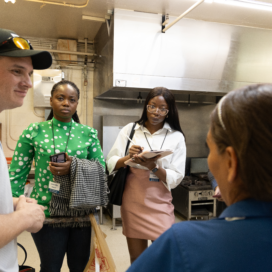From the court to the classroom to the C-suite, Muffet McGraw offers up some pointed leadership lessons about gender inequity
Published: March 19, 2021 / Author: Carol Elliott
Muffet McGraw said that this is the most important thing she did as a coach:
 “Every year, I gather my team in a circle and I say, ‘The only people whose opinion I respect are you. This is it. This is my circle. I don’t care what anybody else says.’”
“Every year, I gather my team in a circle and I say, ‘The only people whose opinion I respect are you. This is it. This is my circle. I don’t care what anybody else says.’”
The former Notre Dame head women’s basketball coach made the comment in response to a question asked during a talk for the Mendoza Women in Business Club, a group consisting primarily of graduate business students for the purpose of fostering a strong and supportive community of prospective and current students and Mendoza alumnae.
During the hour-long session conducted via Zoom, McGraw — probably one of the most critiqued female coaches on the planet, from her coaching record to her footwear — discussed topics ranging from gender inequities in sports leadership, the need for more women CEOs, the evolution of her leadership style, Geno Auriemma, the question that men never get asked (“How do you balance your professional life and your family life?”) and why gathering her team in a circle was the most important thing she did.
McGraw is now teaching Sports Leadership: How Leaders Help Teams Flourish at Mendoza College of Business. She also recently published a new book, Expect More!: Dare to Stand Up and Stand Out, a guide for women seeking to advance their leadership skills. The book encourages women to “approach every opportunity not only with confidence but also with swagger.”
Her entire talk to the Women in Business Club is available here. You can read an excerpt below that has been edited for clarity and length.
In your view, what are the most important leadership qualities?
I think honesty is probably number one. You have to be inspiring, you have to be forward thinking. Those qualities are important. But you also have to be competent. That is something that women are really good at. We’re all very competent in our jobs. It’s unfortunate that employers value confidence more than competence. I think that’s why a lot of women don’t get into leadership positions.
When I look at leadership, I think of somebody who has a vision and a plan for how we’re going to get there. You also have to role model what you want people to act like, how you want them to be, what the culture of your team is going to be. Having that culture of belonging where everybody feels like they’re in a safe environment and they’re somewhere where their voice is going to be heard. Then for me, it’s commitment to excellence. I think those are the things that I really try to stress in my leadership. But certainly everybody wants the leader to be someone they can trust and that’s important.
How has your leadership style changed during your career?
My leadership has done a 180. When I started coaching at Notre Dame, which was a long time ago, Bobby Knight was at Indiana. He was this great coach. He was the Olympic coach, and he was a “my way or the highway” kind of guy. That’s how coaches were back then. I would go to practice and say, “This is what we’re doing. Here’s how we’re doing it. Here’s where we’re going. Get on board.” And I never asked the players what they thought, ever. I bet I went almost 20 years with that philosophy.
Then around 2000 or the late ’90s, I started to talk to the team more. It was more about the relationship, which is a big part of leadership — that empathy and the relationship that you have with the players. Suddenly, I changed. It was a gradual thing in some ways, but it was also a case of looking in the mirror and going, “This is not what that team needs.”
It was a veteran team so I could ask their opinion a little bit more, but it was definitely a conscious decision to move from the dictator or the authoritarian to a little more of an affiliative leader and definitely more about how they felt about things. It was such a positive change, not just for our success, but for me. I loved it more. I was just so much more in tune with what the players were thinking. We saw each other off the court a lot more than we used to. The coach-player relationship used to be very different. Now, as they graduate especially, they come back and we turn into friends, which I couldn’t have imagined at some point in my career. That leadership change was huge.
You’ve said that you learn a lot from failure. Like what?
I think you’ll learn so much more when you lose because you have to really take a hard look at things and ask yourself, “Where did I go wrong? What happened?” Accountability is one of our core values. We never let them blame the referees or blame anything but looking in the mirror and looking at themselves. We take a look at ourselves as a staff — what did we do wrong? Did we prepare wrong? Was it the scouting? Just bad ideas? What do we do with the game? Or was it just the execution of it?
Women especially don’t handle failure that well. We take it personally, just like we take criticism personally. If something goes wrong and we get criticized for it, we get a little defensive, then we get a little sensitive and we’re not exactly excited about taking that next risk. I think that’s where we need to be more like men. When men don’t get a job or something goes wrong, they’re like, “Well, certainly it wasn’t my fault. It was because they had somebody in mind, or they were doing this or that.” For women, we just take it so personally, like, “I wasn’t good enough. I didn’t check all the right boxes.”
Conversely, when we’re praised and people are saying, “great job,” what’s the first thing we say? “Well, my team really did a great job. I couldn’t have done it without my staff. I was just so blessed to have the opportunity. I was in the right place at the right time.” We go the opposite way. When you tell a man he did a great job, he says, “Thank you.” He accepts that he did a great job. But we are so reluctant to accept it because we’re such team players.
Which is why it’s so hard for us in business because we’re walking that tightrope of, “Hey, you got to promote yourself, you got to be confident.” At the same time, we hear, “Wait a minute, let’s not get overconfident. Let’s not be arrogant. You’re supposed to be humble, you’re supposed to be a team player. Stand up and use your voice but not too loudly.” You got to know exactly the tone that you’re going to use. It’s exhausting to try to walk that line. We don’t want to be like men. We lead in a completely different way.
At the Final Four a couple years ago, you had a fantastic press conference that drew a lot of national attention. You obviously use your platform to promote women, how do you encourage both your fellow male and female colleagues to do the same?
It’s easy to get the women on board. We’re all fighting for the same thing. The harder part is getting the men on board. Especially when I’m out there saying, hire more women. There are a lot of male coaches who aren’t really jumping on board with that statement. What I try to tell them is, as the male head coach, hire female assistants. You want to get women who you can mentor and promote and get out there working a little bit better. But we need men. We need men to advocate for us. We need men because they’re 90% of the ADs. We need them to see women in a different way, and I feel like that’s part of my job to really encourage them to see that. When a job is open I might go into the AD and say, “I hope we’re going to look at some women candidates for this job. What about the females for this particular job?”
We need to get them on our side. We’re fortunate that we have that in our athletic department right now, but not everyone does. There are some ADs out there who have only hired women to coach women, and there’s some that really don’t even think about it. When I gave my speech at the Final Four, it was interesting that some people were like, “What is she talking about?” They didn’t have any idea, which is probably worse than the people who are just opposed to it. Because the thing about sexism and gender bias mostly is that they don’t even know they’re doing it, which is probably my biggest frustration. I would almost rather they said, “I’m just not hiring women,” than to say like, “I don’t understand why you’d be upset about that.” We have so many battles to fight, but I think the fight against stereotypes is the biggest one.
You’ve had to face a number of rivalries over the years. How can you work through a rivalry in the business world when you do come across someone that you don’t see eye to eye with?
I think the important thing is open communication. You can agree to disagree, but you have to talk about it. So many times, we get passive-aggressive. We don’t talk about it. We don’t even hear anymore. We’re not listening anymore. Sometimes you’ve got to give a little bit. You have to try to come to a win-win. Say, “What am I willing to give up? If you meet me halfway, what would that look like?” “I know we look at things differently, but you know what — it’s good to have different points of views.” I never want to be surrounded with people who agree with me all the time. You need people who are going to say, “I’ll tell you why that’s not going to work,” because it’s better to do that in the room than to go out and put in a plan and then have it totally fizzle in public.
Sometimes we look at other people all the time and we’re always comparing yourselves. “Gosh, he’s getting all the attention because he’s doing that and I’m not.” Everybody wants to feel important. But it’s important that you look at what you value and you know what you stand for — these are my core values, I’m not going to sway from those. But there are times when I’m going to have to give a little bit to try to get what’s best for the team. That’s the thing — what’s best for the organization? What’s best for the team?
A lot of women in the Notre Dame MBA program are former athletes or current club sport athletes. Do you have any advice on how we can use some of those leadership skills built through sports in the business world?
There’s a huge carryover. I think somebody did a study on female CEOs that showed 80% of them played a college sport. It’s so important because all the things we learn — the discipline, the work ethic, teamwork, unselfish sacrifice and confidence. Sports really can help build your confidence. Probably the one thing that we all need a little more of is confidence. Believing in ourselves is something that we need to do. I wish we would treat ourselves like we treat our friends when they’re about to apply for a job and we tell them how great they’re going to be and they’re the perfect candidate and all these things. Then when it’s our turn, we go, “Well, I’m not so sure.” It is important to find your voice and use your voice, and not to be afraid.
When the Black Lives Matter moment happened this summer, so many people didn’t know what to say so they didn’t say anything. Those are the moments when leaders step up. You can’t worry about what other people are going to say. You have to be able to just say it. Like Eleanor Roosevelt said, “Do what you think is best because you’re going to be criticized either way.” You might as well at least do what you think was best. But in those moments, when there’s a void in leadership and nobody’s talking, people are looking for somebody to step up. That’s our moment.




